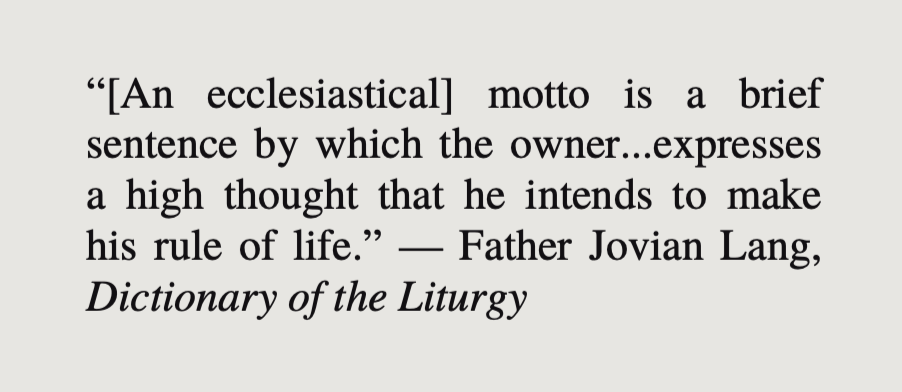Finding Your Spiritual Motto
By Emma Restuccia
St. Josemaría Escrivá when speaking to the laity of his newly founded Opus Dei order, would often encourage, “Say slowly and in all earnestness: Nunc coepi — now I begin!”
This motto, “now I begin,” was actually borrowed from an Italian Catholic priest, Venerable Bruno Lanteri, who used the phrase to note that each moment is a recommitment to holiness on the spiritual voyage. And this motto continues to inspire the faithful, including Catholic father of nine and retired football quarterback Philip Rivers.
As saints and quarterbacks demonstrate, mottos can help shape and define one’s life. Saints throughout the ages have adapted mottos as aids in the journey of faith. Bishops choose mottos to guide their personal and diocesan ministries, and popes, too, take on mottos for their pontificates. On the pathway to heaven, mottos can prove invaluable in growing in and understanding one’s Christian identity fully. Here’s some guidance for choosing your own spiritual motto.
FIND YOUR FOCUS
First, examine your own spiritual outlook. What charism, focus, devotion or strength do you want to guide your path to holiness? Are you drawn to an active or a contemplative life? What virtues attract you? What books of the Bible or verses jump out at you? What devotions inspire you? What cultural issues or areas do you seek to bring the faith to? Considering questions like these combined with some self-reflection and an examination of conscience can provide inspiration for developing a motto.
GET INSPIRED
Drawing inspiration from history, Scripture and the lives of the saints can help one craft a spiritual motto.
Many saints adapted mottos centered on their apostolic mission, often establishing religious orders that lived by their mottos. The Benedictine Order, founded by St. Benedict, lives by the motto, ora et labora, “pray and work,” directing the lives of the religious in a cycle of monastic prayer and labor. Some orders, like the Jesuits, use pithy abbreviations to represent their mottos (A.M.D.G., Ad Majorem Dei Gloriam, meaning "For the greater glory of God"), while others, like the Carmelites, take Bible verses as their guidance. As the inspired word of God, the Bible offers rich wisdom by which to live. Many Catholic mottos of saints, popes and dioceses are written in Latin, another way to consider phrasing a motto.
The layout from the sixth issue of VIGIL, where this article originally appeared
St. John Paul II crafted his papal motto Totus Tuus around his devotion to the Blessed Mother. Meaning “totally yours,” the pope’s motto reflected his love and surrender to Mary, a theme that truly played out in the events of his life. The pope borrowed the motto from another saint, St. Louis Marie de Montfort, who wrote the line in his work True Devotion to Mary. Quotes from the saints offer rich content for mottos––even they copy from one another.
After examining your purpose and looking for inspiration, pray for God to reveal how He wishes to speak and act in you through a motto. It may take time to cultivate and perfect a motto, but once you’ve developed one that reflects your unique spiritual trajectory, you can begin using it to grow further. Pray with your motto, reflect upon it, say it out loud, write it out and utilize it regularly in the quest for holiness. Remember a motto is “living”, meant to prompt action and daily conversion. And if a motto ends up adapting and changing over time, that is OKAY. Growth in sanctity is the goal.
Wherever you are in the spiritual journey, a motto can bear fruit. It is just about taking the first step. “Nunc coepi — now I begin!”












